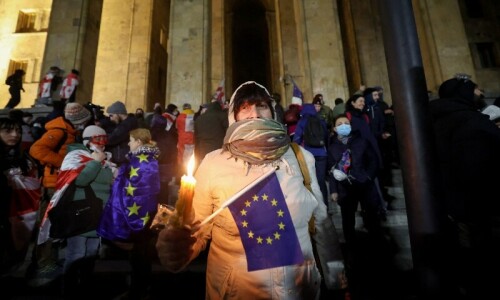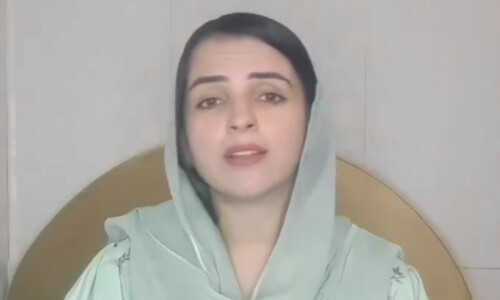BAGHDAD: A 15-year-old girl walks up to an Iraqi police checkpoint on her way to the crowded central market in Baquba, a town some 40 miles north of Baghdad. A constable senses something odd and demands she be searched. The girl promptly announces she is wearing a suicide belt, strapped like a lethal corset round her waist.
In police footage that has gone around the world on YouTube, Rania Ibrahim is handcuffed to metal railings while male officers get her to remove her outer garments, then carefully defuse the device. Never mind the fact that the area is not cordoned off, and other policemen wander close to the girl to gawp. It took not only exceptional bravery but a degree of professionalism that many in Baghdad had not credited the Iraqi police with. The officer who disabled the device was given a $5,000 bonus.
Horror, relief, amazement – but beyond the emotions aroused, a crucial question remains unresolved a fortnight after Ibrahim and many others escaped death. Was she a victim or a villain? And whatever her motives, why has the number of female suicide bombers soared during the past year in a nation that, with Egypt, Syria and Lebanon, has long been seen as one of the most developed and secular societies in the Middle East?
Lt Col D.A. Sims, deputy commanding officer of the Baquba-based US 2nd Stryker Cavalry Regiment, whose staff also interrogated the girl, has an open mind about Ibrahim’s intentions – whether someone strapped the bomb to her against her will and she deliberately behaved oddly at the checkpoint so as to be discovered, or whether she did intend to blow herself up but was pre-empted by police and then tried to lie herself out of trouble.“The Iraqi police identified her as suspicious and she immediately said, ‘Hey, I want to turn myself in.’ She realised she was making a mistake,” Sims says. He is not sure whether the mistake was to start out on a road leading to a violent early death, or to get caught before fulfilling her mission.
Saja Qaduri, a member of the Diyala provincial council (Baquba is Diyala’s capital) and the only woman on its security committee, sat in on some of the police interrogation of Ibrahim. She believes the girl was a committed would-be suicide bomber.
Qaduri says that the girl spoke in a slow, drowsy way during the first moments after the suicide belt had been defused and taken off her, and appeared to have been drugged. But this did not mean she was being made to do something against her will. It could have been done to dull her emotions and reduce the chance of her backing off when the moment came to trigger the belt. “I was at the police station when they first brought her in for questioning. As the pills wore off, she spoke in a very confident way. She strongly believed her death would have taken her to heaven. She was detected because some wires were visible. A policeman spotted it,” Qaduri adds.
In spite of her faith that suicide and murder would take her to paradise, Ibrahim showed flashes of teenage confusion. “At the end of every sentence, she kept saying ‘I want my mum’”, Qaduri says.
If Ibrahim was a genuinely willing suicide bomber, wider and more complex issues of motivation need to be probed. It doesn’t remove the victim-or-villain issue.
Diyala, named after one of the rivers that flow through it (the other is the Tigris), is one of the most conservative rural provinces in Iraq. In its most fertile south-eastern region date palms, orange groves and pomegranate trees stretch for mile after mile along a network of irrigation canals. Few roads are paved, donkey carts are common, and villages are isolated. Tribal structures are strong, male dominance is all-pervasive, and women have suffered repression for centuries. By the age of 15 many girls are married – as Ibrahim was. Few can read.
In this restrictive context, “these women are also victims of the situation”, says Qaduri. “Even this 15-year-old, you feel sorry for her, very young and uneducated. She has no awareness. She comes from a very poor family. Her husband is on the run as a suspected Al Qaeda terrorist. He told her he would meet her in paradise.” (He was arrested by Iraqi police in the town of Hit about a week later.)The view of Iraq as a member of the club of the Middle East’s more developed and secular countries is not wrong — as far as it goes. Essentially this applies to the Baghdad area, with its large, well-travelled middle class, many of whose women and men are fluent English speakers from the days when English was the language of instruction in almost every medical and engineering college.
But among the substantial population in the countryside, as well as a swelling generation of rural migrants who are pulled or pushed into urban slums by the prospect of better pay, country traditions still hold sway in the lives of women: tribal values and patriarchal culture remain extremely strong.
In villages and small towns, women are considered little more than chattels who may not go out of the home unless accompanied by their husbands or a male relative. Three wars in a quarter of a century have left Iraq with more than a million young or middle-aged widows. They are not permitted to live alone, nor do most want to. The death of a husband is not just a cause of grief, bereavement and loneliness. It collapses a woman’s sense of worth, within her extended family as well as in the wider community. Her protection is gone, plus her source of financial support. Unless the woman remarries – a rarity, given the shortage of men – a nephew or a male cousin will be required to move into the house to provide protection, unless one or more of her sons is already in his late teens.
The result can be corrosive levels of depression that haunt women who have seen fathers, brothers, and husbands killed – so, while Ibrahim is the first female suicide bomber to be thwarted in Diyala, many others have gone out into the street wearing a deadly hidden belt. Throughout Iraq some 43 women have carried out suicide bombings since 2003, mostly in the past two years. In 2007 eight women blew themselves up. This year the number is already 30, of whom 15 were in Diyala.
Iraq is not the first Arab country to produce a woman suicide bomber. The first recorded case took place in Lebanon in 1985, where a young pro-Syrian militant targeted an Israeli army unit. In the Israeli-occupied Palestinian territories, bombings by women have also become more frequent, with 10 attacks since 2002.
Women suicide bombers in Iraq are still far outnumbered by their male counterparts but simple logistics offer one explanation for the upward trend: it is a fair bet that men are pushing women into doing this “man’s job” because they usually have a better chance of passing checkpoints wearing their long black cloaks, and male police feel inhibited about touching them. The Diyala police force has recruited 200 women to work at checkpoints and 20 women will graduate from the local police college next month.
Part of the answer to why the chaos launched by the US occupation has impinged so sharply on Diyala, turning a rural backwater into a destructive and self-destructive cauldron of violence, lies in the province’s combination of rural conservatism and unusual ethnic makeup. This combination has made it (including its women) vulnerable to political exploitation, not least by Al Qaeda, a group that wasn’t active in Iraq until the US invasion in 2003.
Dealing with young women who are vulnerable to Al Qaeda recruiting in remote parts of Diyala is a harder task. Qaduri says the priority has to be to restore peace and security to Iraq. Ideally, she would have women’s shelters and rehabilitation programmes for young women. But this is not realistic now. In the meantime, the 20 or so young women whom police identified as potential bombers remain at home in the enclosed and sad environment that has led others like them to blow themselves up. Qaduri sums up the dilemma: “We don’t have proof, so they are still living there.”
—Dawn/Guardian News Service















































Dear visitor, the comments section is undergoing an overhaul and will return soon.